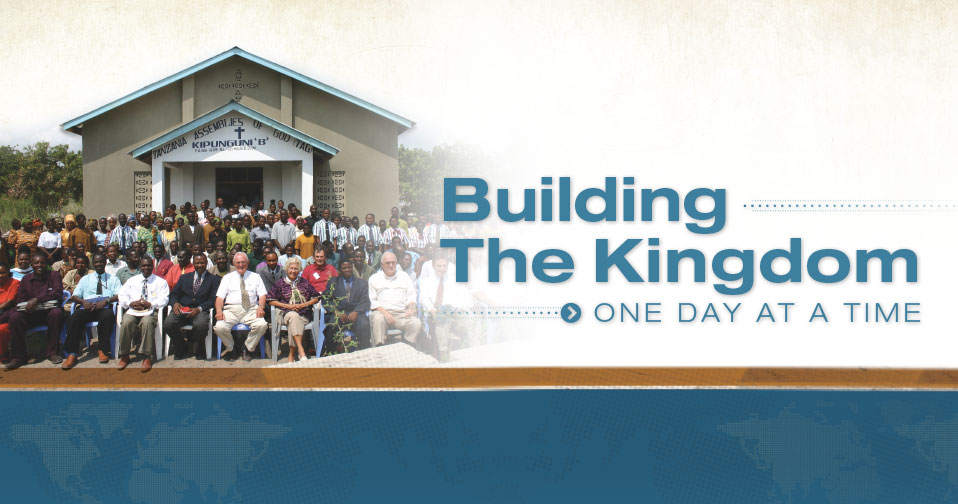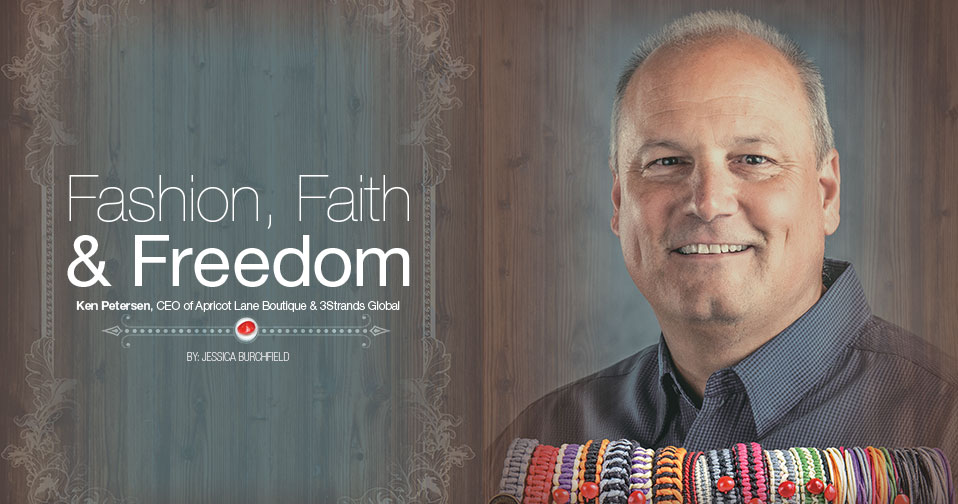Rick Jackson: Unforsaken

For my father and my mother have forsaken me, but the Lord will take me in. For most people, David’s words in Psalm 27:10 are a metaphor. For others less fortunate, they are painfully literal. Such is the case for Rick Jackson. The Lord took him in at a young age and turned his misfortune into miraculous blessings.
Rocky Start
Rick Jackson has no memory of his father. His mother worked, he’ll tell you, worked as a waitress. He recalls her as tenderhearted when sober but unbearable when the bottle got the best of her—times when young Rick learned to keep his distance. Across seven “stepfathers” and eight different elementary schools, Rick remembers his boyhood as one disruption after another.
“With the chaos at home, it was no wonder that I was drawn to structure and stability,” Rick recounts in an article in Guidepost Magazine. “I was five when I walked on my own into the church a mile from our apartment in downtown Atlanta. I might be the only five-year-old in history who got perfect attendance in Sunday school without a parent taking him. On weekdays, I hung out at the neighborhood rec center doing my homework and playing baseball and basketball until the place closed.”
By age thirteen, able to take his home life no longer, Rick ran away. Initially he went to a foster home where the parents and kids warmly welcomed him, treating him better than he’d ever been treated. For the first time, he witnessed a family sitting down to dinner together, for instance, and praying before the meal. But the love and generosity were all too foreign—and too hard to process. Unable to understand and finally suspicious of the family, Rick reacted the only way he knew: he fled home to the only normal he knew. By now, however, even that was too much. Rick soon wound up in the United Methodist Children’s Home, in a group with nine other teenage boys.
Rick liked his house parents and the company of the other boys, but as Christmas neared the boys began to be picked up, one by one, to spend holidays with relatives, until Rick was the only boy left. On Christmas morning, he woke up to the loneliness of the empty house and noticed an envelope on the floor under his door. It had his name on it, so he opened it to find a $100 bill with a note saying, “Merry Christmas from an anonymous donor.”
In his whole life, Rick had never seen so much money. He ran down to ask his housemother where it had come from, and she told him the man wanted to stay unnamed. “Can I write to thank the generous stranger?” Rick asked—and his housemother said yes, she would relay a note.
A Spark Ignited
This act of kindness made an incredible impact on Rick. Here was the love of Christ through a complete stranger—on top of the foster family that took him in and his house parents in the group home. God had a purpose for him greater than his background and circumstances.
Rick eventually would reestablish a relationship with his mother after she quit drinking. He also returned to the original foster family. Having gained a new appreciation for them, he understood the source of their love, and he stayed with them until he started college.
Rick attended college at a Christian school in Nashville where he worked three jobs and borrowed to get by until money ran out. College also was where Rick met and married his first wife. They moved back to Atlanta to a mobile home, and Rick took a job with the collections company, Frost-Arnett. In his first few months there, he collected more money than the salaries of several employees combined.
Business Mogul
Attempting to get into management with the company, Rick was moved to its Nashville office. It turned out to be a poor fit. “One day I set a record for the number of calls made and promise payments committed,” Rick recalls. “Three days later my old and nearly senile boss was screaming and berating me. I told him I would take that from no one. I walked out and immediately returned to Atlanta. That was on a Saturday. When I arrived in Atlanta, the next day I got the Sunday paper and scoured the help-wanted ads. “
The ambitious 21 year old had no degree, but that didn’t deter him. Rick saw an opening at a staffing company called Perimeter Placement, which he contacted, and where he was promptly turned down for lack of a degree. Asking what a degreed person could earn, he was told $1,400 per month draw against a 40-50 percent commission. Would they hire him, Rick asked, on no draw and a 33 percent commission? They agreed and quickly hired him. In the first month, he made more money than he’d made in his entire life!
After working at Perimeter Placement for a few years, Rick approached the general manager about starting his own company. The two had been in Bible studies together and had a good rapport. Both men also knew that the owner was bleeding the company for other investments. Rick purchased Perimeter Placement from the owner and grew it to four employees. A year later, he sold it to return to executive search work at Jackson Coker Associates—with the former boss who had sold him Perimeter Placement. After a year, Rick bought the company and renamed it Jackson & Coker Associates. In the next three years, he built Jackson & Coker into the nation’s largest retained search firm specializing in physicians.
Honing His Skills
By now Rick was taking night courses at Georgia State University, where he met a PhD in business management, Dr. Bill Franklin. Unsure about his ability to run a large business, Rick hired Bill for $2,000 per month (a large sum in the late ‘70s) to teach him everything an MBA knows. Thirty-five years later, that PhD from the night class is still with Rick—now a strategic consultant and a company vice chair.
In 1989 an investor was brought in to Jackson & Coker Associates, and a short time later, Rick was forced out of his own company. Not surprisingly—not by now—he just started more firms on his own, and the businesses flourished. Once again investors were brought in, and this time one of the companies went public, making Rick chair and president of Allegiant Healthcare Services.
By now, so prolific was Rick’s business sense that he was offered a deal to start ten new businesses, investing $5 million for each new business. Putting his experience and creativity to work, in short order he created the third-largest surgery center in the nation, the largest pain-management business, the largest multi-site allergy practice, and more. The roll seemed unstoppable until rules changed under the Clinton administration, and Rick’s love for venture capitalism faded.
No Fear Of Failure
Rick has always had keen entrepreneurial instincts, but in spite of considerable success, he admits to plenty of setbacks.
“Failing is how you grow,” Rick said. “Success is getting up one more time than you fall down.” Rick Jackson
Rick went back as chair to Allegiant Healthcare Services, now struggling under poor management. In 1996 they were were forced to file Chapter 11 bankruptcy, and it took four years to climb out of the hole. Notably, however, they were able to pay $1.10 on the dollar to every creditor and to return money to some of the equity holders.
During that time, Rick also made time to study his strengths. He was best at betting on himself, and in 2000 he bought out two of the businesses from the Allegiant Healthcare Services bankruptcy and focused on growing them. He sold off a surgery software business and developed the current Jackson Healthcare, a venture operating company for about 15 businesses, generating some $700 million per year. Of the subsidiary companies, one provides temporary doctors, another nurse practitioners, another surgeons, and so on. Each is highly focused and specialized. Jackson Healthcare now is one of the largest healthcare staffing companies in the country, serving more than 5 million patients per year at more than 1,300 medical facilities.
Charity As A Business
While Rick had always had a philanthropic heart and had started a charitable organization called the Jackson Family Foundation, it was a Generous Giving seminar in 2004 that spurred him to think about the far-reaching implications of giving. “All these questions ran through my mind,” he recalls. “‘What do I do now? How much is enough?’ I had been going through a Bible study on Bob Buford’s book Halftime and was facing the last half of my life after spending the first half generating financial resources.
“Like most first-generation money, I just didn’t know how to responsibly manage wealth and giving. I asked Ron Blue—who has a wealth management firm and has written many books and gives seminars on wealth management—if I should sell everything and become a missionary. I asked what I could do to make the most impact on the Kingdom with my time left on earth. Ron told me something then that may seem obvious, but to me it was revolutionary. He said, ‘There are a thousand people who can dedicate their lives to the mission field and help the poor. That’s where God placed their passion and uses them. Few people can generate wealth, however, and that is your gift. Serve God by generating wealth and doing what you know and are good at.’”
Venture Philanthropy
Rick used that bit of wisdom to create and implement a new philosophy called “venture philanthropy.” With the acumen, skills and discipline he knew from business, he built non-profits aimed at solving significant social problems. Venture one was Faithbridge Foster Care—an issue near and dear to his heart—to address child placement in the U.S. Currently working through churches, FaithBridge has more than 160 children in Christian homes. Using the same budgeting requirements and procedures as a for-profit business, FaithBridge is closer every year to being fully self-funded.
Taking the giving-business model a step further, Rick led the effort, with Larry Powell and Mike Kendrick (two fellow Christian businessmen and close friends), to purchase and convert Family Christian stores, a national chain of several hundred outlets, to a non-profit, hoping to turn all business profits back to charitable entities.
Led by Mike Kendrick, the gentlemen also started iDisciple, a source for daily spiritual connection with sermons, devotionals, music and more, tailored to user interests. Content arrives daily to a phone or computer.
While Rick initially preferred to keep his charitable work off the radar, God had other plans. Rick’s oldest son, Shane, was on the board of a missions group sending missionaries to Honduras. “Could the trips use surgeons?” Rick asked. “Yes,” his son said, and Rick emailed a quick and informal query: any surgeons interested in a mission trip to Honduras, travel expenses paid? “We had a hundred surgeons reply!”
Rick says, “I knew then that I needed to be more vocal about our charitable work. It’s not about me; it’s about God’s plan to put people into action to serve His needs. We started attracting even more business as a result of our charitable work. Young people especially are drawn to it. In fact, it’s one of the top three reasons they come to work for us. Young people today really want to give.”
The Big Screen
Rick’s latest venture is a new faith-based production company Giving Films. Its first project, 90 Minutes in Heaven, based on the bestselling book of the same name, opened in theaters in September 2015.
“This is totally different for me, and I spent the first 42 days straight diving in,” Rick explains. “We want more faith-based entertainment for families. We believe we’ve put together a model to make that happen and to provide another revenue channel for our charitable organizations. We invested the initial capital to fund the production and will get that back to reinvest in future projects. Any profits the movie generates go to women, children, and veterans.”
With numerous companies and non-profits vying for his attention, Rick also stays intentional about making time to connect with God and to enjoy his family. He knows where he’s from, and he makes a point to regularly visit foster homes. To people whose lives may seem hopeless, Rick Jackson has a resounding message: there is One in whom all things are possible.
Matthew 25:40 says “Truly I tell you, whatever you did for one of the least of these brothers and sisters of mine, you did for me.”

By: Mark Whitaker
Mark Whitaker is the Executive Editor of TwoTen Magazine. He is inspired daily by his God, his wife Kim and his three daughters Hannah, Sarah, and Rhea.
Read More Articles by Mark Whitaker





